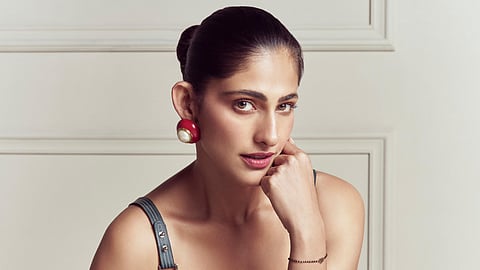Kubbra Sait talks about self-discovery, and saying ‘no’ with confidence
In a world obsessed with finding ‘the one’, Khwaabon Ka Jhamela dares to ask: what if the most important relationship you can have is with yourself? Kubbra Sait, steps into the role of Shehnaaz, a woman who unapologetically puts her happiness first. With roles like Shehnaaz, she’s not just entertaining audiences but redefining what it means to live authentically. With her trademark wit, Kubbra chats with Indulge about embodying Shehnaaz’s strength, her own take on love and relationships, and how OTT platforms have reshaped the choices available to actors today.
What drew you to Shehnaaz, and how did you prepare for the role?
Shehnaaz is a powerful character. She pivots the protagonist Zubin’s (played by Prateik Babbar) journey. There’s a point where she tells him, ‘I don’t want to be a b***h.’ And when he responds, ‘I didn’t call you a b***h,’ she says, ‘I don’t want you to even want to call me one.’ That line reflects her clarity—she knows they aren’t right for each other. As women, we’re often conditioned to put others’ happiness first. Shehnaaz represents the power of choosing yourself. Prepping for her was intuitive; I understand her psyche because I’ve said no in my own life. Being single for as long as I can remember, I’ve found empowerment in saying no. And Shehnaaz gave me another opportunity to channel that strength.
Shehnaaz feels stifled by Zubin’s organised nature. How do you personally relate to this dynamic of order versus spontaneity?
(Laughs) I’m the type who would jot down five-pointers for a spontaneous plan. I like things organised—there’s nothing wrong with that—but obsessing over it? That’s where the trouble begins. Playing Shehnaaz reminded me that we often attach too much of our identity to certain behaviours, which limits growth. I love order, but I’ve learned to balance it and not impose on others.
The film critiques the idea of soulmates. What’s your take on it?
Our souls are so vast, but we often shrink them to fit concepts like ‘soulmates’. If soulmates exist, it’s not about one person fixing another—it’s about partnership. Relationships thrive when both people show up as cheerleaders, building a bond from both ends. We’re quick to update our iOS software but don’t apply the same logic to concepts like love, marriage, or soulmates. People are complex, and our understanding of relationships should evolve with us.
Do you have any memorable moments while working with Prateik Babbar and Sayani Gupta?
My broken hand was a running joke on set! I broke it just before shooting and had to film intimate scenes with Prateik while my arm was stuck at a 90-degree angle. With Sayani, it was my first time working with her, and we had this beautiful scene where her character Ruby and Shehnaaz realise they’re fretting over a boy neither of them is dating. It’s profound.
How has OTT changed the game for you as an actor?
OTT has been liberating. When I started 15 years ago, there were only films, and I didn’t have the luxury to say no. I took everything that came my way, and while I’m grateful, it wasn’t always a choice. Now, I can pick roles that challenge me. OTT has created space for diverse stories and given actors the power to be selective. I no longer have to take on roles that don’t align with my purpose.
Intimacy coordination is a key part of the film. How do you view its importance in cinema today?
It’s as essential as having a choreography or action director. An intimacy coordinator ensures scenes are executed respectfully and authentically. Resisting change is lazy. If we embrace it, we can tell more honest, impactful stories.
Describe your style in one word.
Boho casual chic.
What is your go-to fitness routine?
Strength training. Cardio is a sham—go lift weights!
A life mantra you live by.
In the race to uniqueness, there is no finish line.
Khwaabon Ka Jhamela is streaming on Jio Cinema.

